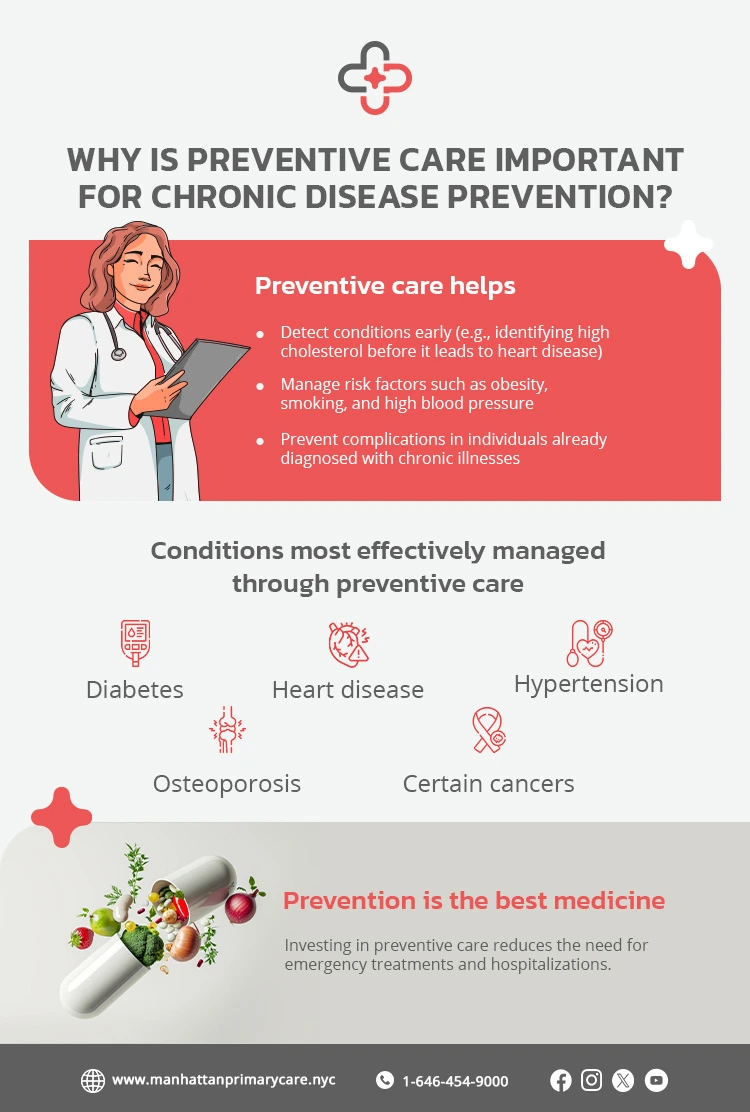Imagine if you could reduce your risk of developing serious conditions like diabetes, heart disease, or cancer simply by taking a few proactive steps. This is exactly what preventive care is designed to do to protect your health before illness strikes.
At Manhattan Primary Care, we believe preventive care plays a crucial role in improving overall well-being by focusing on early detection, regular screenings, and lifestyle adjustments. Whether you’re looking to reduce your risk of chronic diseases or manage an existing condition, adopting preventive care strategies can be life-changing.
What Is Preventive Care?
Preventive care refers to medical services aimed at preventing illness, detecting health conditions early, and promoting long-term wellness. It includes:
- Routine check-ups and health screenings
- Vaccinations and immunizations
- Counseling and lifestyle education to manage risk factors
Prophylaxis refers to preventive measures such as medications, vaccines, or lifestyle changes designed to prevent illness. For instance, taking aspirin to prevent heart attacks or using fluoride treatments for dental health are examples of prophylactic care.
What’s the Difference Between Preventive Care and Diagnostic Care?
Preventive Care:
Focuses on preventing illness or detecting conditions early.
- Examples:
- Annual wellness visits
- Routine screenings for blood pressure, cholesterol, or cancer
- Vaccinations
Diagnostic Care:
Focuses on identifying the cause of existing symptoms or confirming a diagnosis.
- Examples:
- Imaging tests like X-rays or CT scans to investigate symptoms
- Blood tests to diagnose diabetes, heart disease, or thyroid issues
Key Difference:
Preventive care is proactive, while diagnostic care is reactive to emerging symptoms.
What Is Considered Preventive Care?
Preventive care includes services designed to catch potential health risks before they develop into serious problems. Examples include:
- Annual physical exams to assess overall health
- Screenings for blood pressure, cholesterol, and blood sugar
- Cancer screenings such as mammograms, colonoscopies, and Pap tests
- Immunizations for flu, pneumonia, and COVID-19 are crucial for preventing seasonal illnesses. Understanding Flu Type A and B helps you take preventive steps during flu season.
- Counseling services for smoking cessation, nutrition, and mental health
Why Is Preventive Care Important for Chronic Disease Prevention?


Preventive care helps:
- Detect conditions early (e.g., identifying high cholesterol before it leads to heart disease)
- Manage risk factors such as obesity, smoking, and high blood pressure
- Prevent complications in individuals already diagnosed with chronic illnesses
Conditions most effectively managed through preventive care include:
- Diabetes
- Heart disease
- Hypertension
- Osteoporosis
- Certain cancers
Prevention is the best medicine:
Investing in preventive care reduces the need for emergency treatments and hospitalizations.
What Preventive Care Do You Need and When?
In Your 20s-30s:
Focus on mental health, STI testing, and lifestyle counseling.
In Your 40s:
Begin essential screenings such as cholesterol checks, mammograms, and diabetes tests. For women, comprehensive women’s health services including Pap smears, mammograms, and bone density assessments are available at Manhattan Primary Care to support overall health and early detection.
In Your 50s+:
Prioritize colonoscopies, bone density tests, and heart disease screening.
Ongoing Preventive Services:
- Annual wellness visits
- Vaccinations (as recommended by your doctor)
- Screenings based on family health history
Benefits of Preventive Care: Why It’s Worth It
- Early detection of illnesses leads to faster treatment and better outcomes.
- Reduces the risk of developing chronic diseases.
- Helps manage mental health by addressing anxiety, depression, and stress early.
- Cost savings: Preventive care services are often covered by insurance, reducing long-term healthcare costs.
- Encourages healthier lifestyle habits to improve overall well-being.
Managing Chronic Diseases With Preventive Care
If you have a diagnosed condition, preventive care can help you:
- Control symptoms through medication and lifestyle adjustments.
- Prevent disease progression with regular monitoring and early intervention.
Conditions that benefit from preventive care include:
- Diabetes: Routine A1C tests and eye exams can prevent complications.
- Heart disease: Blood pressure monitoring and cardiovascular screenings reduce heart attack risk.
- Osteoporosis: Bone density tests help prevent fractures.
Conclusion
Preventive care is key to reducing the risk of chronic illnesses, improving quality of life, and lowering healthcare costs. By incorporating routine check-ups, health screenings, and proactive lifestyle changes, you can protect your future well-being.
At Manhattan Primary Care, we encourage you not to wait for symptoms — start focusing on preventive healthcare today. Investing in your health now can lead to a longer, healthier life.
Frequently Asked Questions
How can lifestyle habits enhance preventive care efforts?
Healthy habits like exercise, balanced nutrition, and proper sleep boost immunity, reduce inflammation, and improve mental well-being, enhancing preventive care outcomes.
Can stress management be part of preventive care?
Yes, techniques like meditation, yoga, and mindfulness can lower stress, reducing risks for heart disease, anxiety, and hypertension.
Are virtual healthcare visits effective for preventive care?
Yes, telemedicine effectively manages check-ins, mental health support, and lifestyle counseling.
How does family medical history impact preventive care strategies?
It helps identify genetic risks, guiding tailored screenings and preventive interventions.
Disclaimer
This blog is for informational & educational purposes only and does not intend to substitute any professional medical advice or consultation. For any health-related concerns, please consult with your physician, or call 911.
